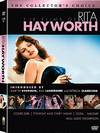





Cathy O'Donnell
Biography | Filmography | Articles | Bibliography | Downloads | Links | Image Credits | THE BEST YEARS OF OUR LIVES | BEN-HUR
| Article 3 |
Dear Mr. Goldwyn...By Joseph WechsbergThe New York Herald Tribune, September 1, 1946Young Cathy O'Donnell, pretty Following the odd Hollywood fashion that has created such definitions as The Look (Bacall), The Voice (Sinatra), The Body (Macdonald), The Nose (Durante), and The Bottle (Milland), we herewith present "The Letter." The Letter is 23 years old, frail and pretty, has brown hair, brown eyes, and her name is Cathy O'Donnell. The Letter is under contract to Mr. Samuel Goldwyn who in addition to having many other virtues now emerges as a full- fledged amateur of the belle-lettres. Not long ago, Mr. Goldwyn received a letter from his new starlet. It was postmarked Boston where Cathy was then getting stage experience as prescribed be her boss. He opened the envelope and found in it a poem. It was titled "Once I Found a Moonbeam" and it went like this: Once I found a moonbeam And that is why I walk through walls Oh, if you long to come to me "It was badly timed," a satellite at the Goldwyn lot remembers. "MacKinlay Kantor, the novelist, had just discussed with Goldwyn making a movie out of the book, 'Glory For Me.' Mr. Kantor then went away. At long last he sent Mr. Goldwyn the book. It was written in verse, of all things!" Cathy's nice little poem came a couple days later. No wonder people around Mr. Goldwyn's office were getting a little worried about poetry." They got over the shock though, made a screenplay out of "Glory For Me," and called it "The Best Years of Our Lives." Poetess Cathy O'Donnell will have an important part in the picture-- her debut. The Letter is a veteran of Harding Junior High at Oklahoma City, Oklahoma City University, a Gregg shorthand course, the American Academy of Dramatic Arts and the road company of "Life With Father." Her arrival in Hollywood was noted neither by columnists, casting directors, nor wolves. She had saved up enough for a short stay in a furnished room near the Sunset Strip. One day an agent met Cathy, promptly rushed her to Goldwyn. "He drove into the lot," Cathy says. "He knew the doorman. That impressed me." "What's She Talking?"Goldwyn was impressed too. Then Cathy said something and Goldwyn looked blank. "What's she talking-- English?" he asked, and pressed four buzzers. Three henchmen appeared and one henchwoman. Goldwyn explained that he wanted Cathy to get rid of her Southern accent, adding: "I'm giving you my best voice coach for perfect English. She's Russian." Next Cathy found herself packed East, where she was to get dramatic experience. She went into the road company of "Life With Father" for four months. It was the bread-and-butter period of her life. Three times a week she wrote to Mr. Goldwyn: On New York ("I don't ever want to live in New York"), on feuds ("the boy who plays opposite me has been upstaging me and we had a feud"), on the critics ("they were kind except in Boston where they said I was too coy"). These excerpts should convince movie-struck girls that to get ahead you don't have to be seen in nightclubs, divorce your fifth husband or wear a sarong. All you have to do is write letters and poetry and address them to the boss. If you happen to be 23, lovely, talented and ambitious, it will help. © 1946 New York Herald Tribune |
|
Article 1
| Article 2 | Article 3 |
| Now in Print! |
|---|
| Now on DVD! |
|---|
Buy Videos & DVDs |
|
Buy Movie Posters |
|
Buy Movie Posters |
|
Classic
Movie Merchandise |
|
![]() Printer-friendly version.
Printer-friendly version.
![]() Return
to the top.
Return
to the top.
Last updated:
March 10, 2011.
Reel Classics is a registered trademark of Reel Classics, L.L.C.
© 1997-2011 Reel Classics, L.L.C. All rights reserved. No
copyright is claimed on non-original or licensed material.
Terms of
Use.









